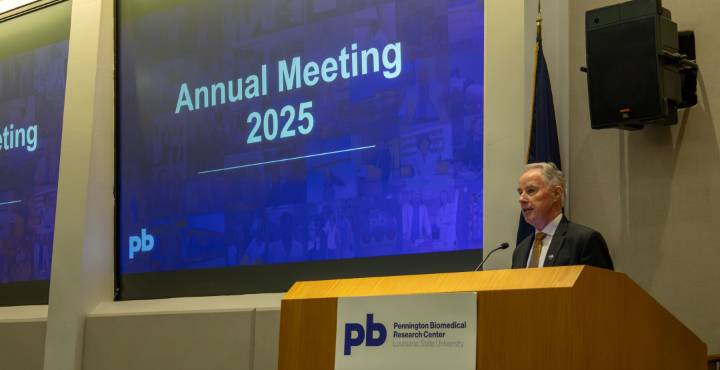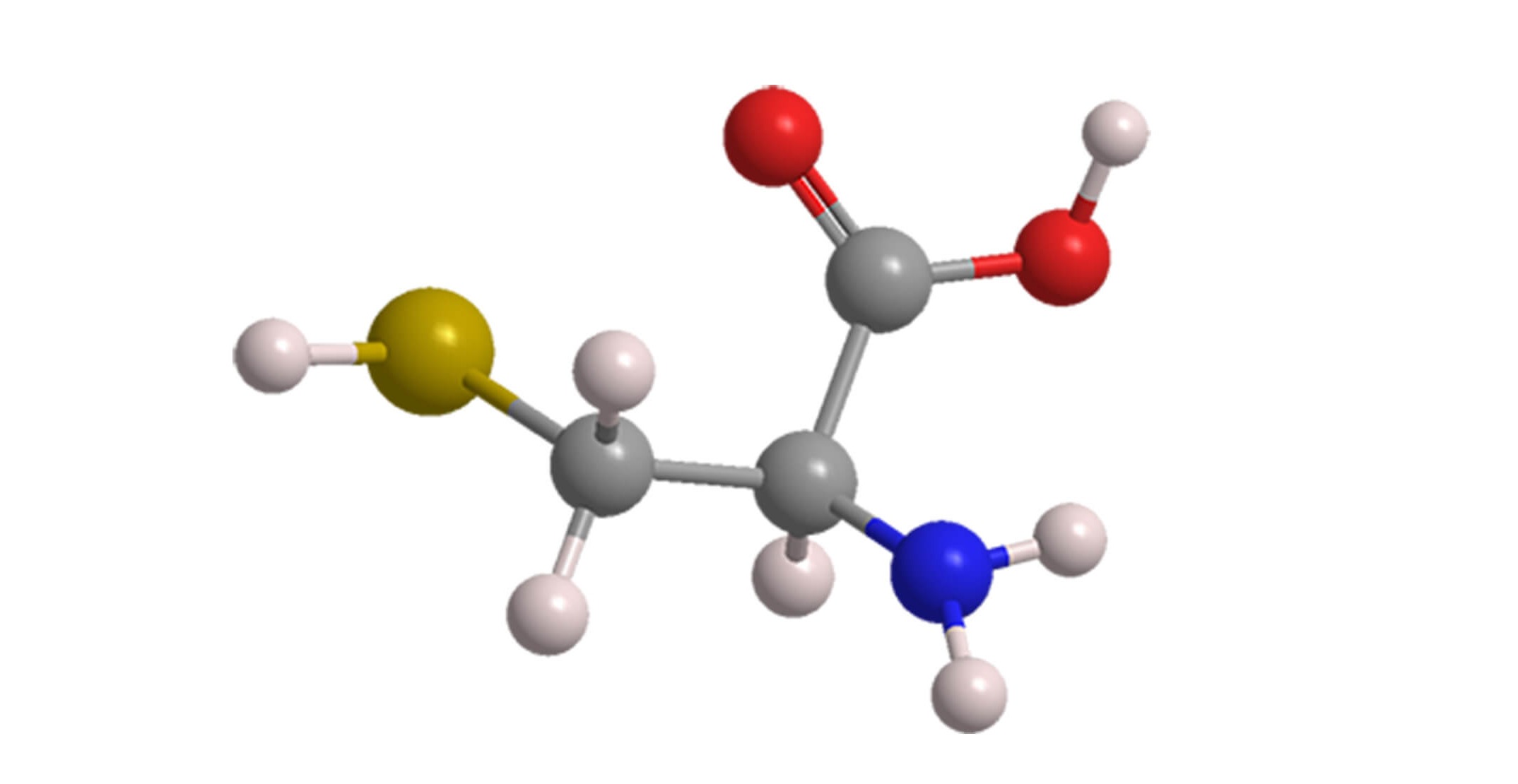News Feed

Pennington Biomedical Sets the Standard in Nutrition Research
When "Doc" Pennington pledged $125 million to establish the Pennington Biomedical Research Center, his ambitious vision was unequivocal: “This should be the biggest and best nutrition research center in the country.” Four decades later, that bold aspiration has not only been realized – it has been surpassed on a global scale. Pennington Biomedical now stands as one of the world's most influential and scientifically productive nutrition research institutions. As the nation observes National Food is Medicine Day on September 14, the pioneering work of Pennington Biomedical researchers takes on heightened significance. Their investigations into the critical role of nutrition in preventing and managing chronic diseases, while promoting optimal health across populations, have fundamentally advanced our understanding of food as therapeutic intervention.
Learn More
Dr. Steven Heymsfield Named LSU Boyd Professor – LSU’s Highest Faculty Honor
Pennington Biomedical Research Center is proud to announce that Dr. Steven B. Heymsfield, Professor of Metabolism and Body Composition, has been named a Boyd Professor of Louisiana State University – the highest faculty rank and honor awarded within the LSU System. The Boyd Professorship is reserved for faculty whose outstanding achievements and international reputations bring significant prestige to LSU. Dr. Heymsfield joins an elite group of scholars recognized for advancing knowledge and transforming their fields.
Learn More
Study Points Out that a Synthetic Molecule Helps Reduce Visceral Fat and Improve Sleep
A study conducted by researchers from the Pennington Biomedical Research Center, Proteimax Biotechnology (Israel), and the University of São Paulo’s Biomedical Sciences Institute (ICB-USP, Brazil) showed that ingesting Pep19 helps reduce visceral fat and improve sleep in obese adults. The molecule is a synthetic version of a peptide (a very small piece of protein) naturally found in human cells. Previous studies involving animal models have shown that Pep19 has anti-obesity effects and improves indicators such as blood sugar, cholesterol, and blood pressure.
Learn More
Pennington Biomedical Q&A: Dr. Timothy Gilbert
Lake Charles-native Dr. Timothy Gilbert recently relocated to Baton Rouge for an important mission. Identifying the growing need in the community, the Pennington Biomedical Research Center launched the Advanced Endocrinology and Diabetes Clinic, and Dr. Gilbert, an endocrinologist with more than 20 years of experience, was tapped to serve as its leader.
Learn More
Pennington Biomedical Researchers Available to Share Insights and Perspectives During National Childhood Obesity Awareness Month
Recognized by the Centers for Disease Control and Prevention, September is designated as National Childhood Obesity Awareness Month in the United States. At Pennington Biomedical Research Center, researchers explore a wide array of scientifically proven causes, treatments, and prevention programs to understand and address childhood obesity, including healthy food choices, environmental factors, and accessibility of parks and playgrounds.
Learn More
Pennington Biomedical Reflects on 20th Anniversary of Hurricane Katrina
As Louisiana reflects on the 20th anniversary of Hurricane Katrina, Pennington Biomedical Research Center is remembering the extraordinary efforts of its faculty, staff, and volunteers who mobilized in 2005 to support evacuees, provide lifesaving diabetes care, and ensure continuity for LSU Health Sciences Center students displaced by the storm.
Learn More
Pennington Biomedical Researchers Find Metabolic Health of Pregnant Women May Matter More than Weight Gain
Metabolic health before and during pregnancy may have a bigger influence on risks for mother and baby than simply controlling weight gain. Data from a recent paper by Pennington Biomedical researchers indicates that pregnant women with metabolically unhealthy obesity were more likely to develop gestational diabetes than those who were metabolically healthy. The paper, “Metabolic Health and Heterogenous Outcomes of Prenatal Interventions: A Secondary Analysis of a Randomized Clinical Trial,” was published in the Journal of American Medical Association.
Learn More
Pennington Biomedical Opens Advanced Endocrinology and Diabetes Clinic
LSU’s Pennington Biomedical Research Center has opened a new Endocrinology and Diabetes Clinic in Baton Rouge. The clinic provides specialized care for patients managing diabetes and endocrine disorders, bringing world-class expertise to the region.
Learn More
Pennington Biomedical’s Dr. Leanne Redman Named LPFA Endowed Chair
Pennington Biomedical Research Center's Leanne Redman, PhD, has been named as the Louisiana Public Facilities Authority (LPFA) Endowed Chair in Nutrition, a chair established through private donations matched by the Board of Regents Support Fund. Dr. Redman was appointed by Pennington Biomedical leadership, with the appointment approved by the Louisiana Board of Regents in April 2025. Her appointment to this esteemed honor follows the reversion of the award from an Endowed Postdoctoral Fellowship back to an Endowed Chair.
Learn More
Pennington Biomedical’s Annual Men’s Health Summit Scheduled for Saturday, Aug. 23
Registration is now open for the 2025 Pennington Biomedical Men’s Health Summit, scheduled for Saturday, Aug. 23. Presented by Our Lady of the Lake Health and hosted by Pennington Biomedical Research Center and the Pennington Biomedical Research Foundation, the free summit is available to all men over the age of 18. The summit welcomes men from across the Capital Region to learn more about their health, and it will featuring a wide variety of complimentary health screenings and informational sessions. Additionally, the CORE UFC Gym will host a UFC and self-defense demonstration, and the Baton Rouge Corvette Club will be on-site for a showcase of classic sports cars.
Learn More
Pennington Biomedical Celebrates Growth, Global Recognition at Annual Meeting
On Friday, Aug. 1, Pennington Biomedical Research Center brought together its faculty, staff, and leadership for its annual Center-wide meeting, where Executive Director Dr. John Kirwan delivered a forward-looking address underscoring the institution’s momentum, resilience, and global leadership in metabolic research.
Learn More
Answer ALS Launches AI Drug Development Collaboration with Tulane, Pennington Biomedical Research Center and GATC Health to Advance ALS Treatment Discovery
Answer ALS is proud to announce the launch of a groundbreaking collaborative initiative aimed at accelerating AI-powered drug discovery for ALS and other neurodegenerative diseases. This effort, known as the Louisiana AI Drug Development Infrastructure for ALS (LADDIA), brings together leading institutions and innovators, including Tulane University, Pennington Biomedical Research Center, and GATC Health - a tech-bio innovator using validated AI models to accelerate drug discovery from large-scale multiomics data-, to harness the power of artificial intelligence and one of the largest ALS datasets in the world.
Learn More
Pennington Biomedical Q&A: Dr. Kara Denstel
Dr. Kara Denstel is leading the Pennington Generation study, which is designed to capture a clear picture of the health of Louisiana families, specifically physical activity, sleep quality, eating habits and more. Dr. Denstel recently participated in a Pennington Biomedical Q&A to elaborate on the Pennington Generation study, how she got involved, and what she and colleagues hope to learn from the collected data.
Learn More
Tirzepatide Reduces Food Intake and Appetite, and Affects Brain Functioning, more than a Placebo and Liraglutide
Researchers found that tirzepatide, a medication primarily used for treating type 2 diabetes and weight loss, reduced body weight, food intake and many measures of appetite more than placebo and liraglutide. These results were recently published in Nature Medicine in the study titled “Tirzepatide on ingestive behavior in adults with overweight or obesity: a randomized 6-week phase 1 trial.”
Learn More
Reduction in Amino Acid Cysteine Triggers Weight Loss
Consuming fewer calories is largely accepted as a way to improve health and lose weight, but a recently published study in Nature Metabolism points to a specific sulfur-containing amino acid cysteine as a key component in weight loss. In the study “Cysteine depletion triggers adipose tissue thermogenesis and weight loss,” researchers discovered that when study participants restricted their calorie intake, it resulted in reduced levels of cysteine in white fat.
Learn More
Bill Signing Event Held at Pennington Biomedical Research Center
Louisiana Governor Jeff Landry hosted a bill signing event at Pennington Biomedical Research Center on Friday, June 27, joined by U.S. Health Secretary Robert F. Kennedy Jr. The event drew approximately 200 attendees, including legislators and community members, with supporters standing on stage alongside the Governor, Secretary, and bill sponsor Senator Patrick McMath.
Learn More
New GLP-1 Therapies Enhance Quality of Weight Loss by Improving Muscle Preservation
Findings from two groundbreaking studies highlight potential pharmacological and biosensor solutions for muscle mass preservation in patients undergoing obesity treatment therapy. Results from the BELIEVE study of bimagrumab and semaglutide combination therapy and a study of a novel continuous protein sensor for sarcopenia management were featured as a late-breaking symposium and late-breaking poster, respectively, at the 85th Scientific Sessions of the American Diabetes Association® (ADA) in Chicago.
Learn More
Pennington Biomedical Researchers to Present at the ADA’s 2025 Scientific Sessions in Chicago
Researchers from Pennington Biomedical Research Center are scheduled to present their latest findings in diabetes research and treatment at the American Diabetes Association’s (ADA) flagship conference, the 85th annual Scientific Sessions taking place June 20 – 23 in Chicago.
Learn More
Louisiana Obesity Society Conference Returns Aug. 8 and 9 in New Orleans
The Louisiana Obesity Society (LOS) and the Louisiana Chapter of the American Society for Metabolic and Bariatric Surgery (LA-ASMBS) announce the return of the Louisiana Obesity Conference Aug. 8 and 9, in New Orleans. The third annual, two-day conference will be held at the Loews New Orleans Hotel and will feature opportunities for networking, continuing education courses, vendor showcases and much more. Keynote speakers will include Donna Ryan, MD, professor emerita at Pennington Biomedical Research Center, and Erik Wilson, MD, medical director of bariatric surgery at Memorial Hermann-Texas Medical Center.
Learn More
Pennington Biomedical’s Greaux Healthy Initiative for Louisiana Addresses Childhood Obesity
Pennington Biomedical Research Center publicly introduced its Greaux Healthy initiative, a public service initiative designed to help improve Louisiana kids’ health at every age, during the weekly Red Stick Farmer’s Market on Thursday. Developed in partnership with the State of Louisiana, Greaux Healthy implements 35 years of Pennington Biomedical research and discoveries to inform tools, resources and programing for children, parents, healthcare providers and educators throughout the state.
Learn More


